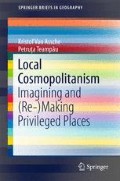Abstract
In this chapter, we bring back the comparison with Trieste, Odessa and Tbilisi, confront this with our initial theoretical frame, and take stock of its development. We discuss the image of local cosmopolitanism and its local construction we obtained after our investigations, and what this image means for a general perspective on globalization. Zooming in, we then return to the question of policy relevance: what can our analysis tell us about the implications of cosmopolitanism for policy, how and why should policy and planning envision a cosmopolitan future or past, what are the possibilities and limits of steering in this.
Access this chapter
Tax calculation will be finalised at checkout
Purchases are for personal use only
References
Anderson B (2006) Imagined communities: reflections on the origin and spread of nationalism. Verso Books, London
Beunen R, Van Assche K, Duineveld M (2015) Evolutionary governance theory: theory and applications. Springer, Heidelberg
Delanty G (2009) The cosmopolitan imagination. Cambridge University Press, Cambridge
Deleuze G, Guattari A (1987) A thousand plateaus. University of Minnesota Press, Minneapolis
Easterly W (2014) The tyranny of experts: economists, dictators, and the forgotten rights of the poor. Basic Books, New York
Fischer F (1990) Technocracy and the politics of expertise. Sage, Newbury Park
Fischer F (2000) Citizens, experts, and the environment: the politics of local knowledge. Duke University Press, Durham
Fischer F (2009) Democracy and expertise: reorienting policy inquiry. Oxford University Press, Oxford
Fuchs S (2001) Against essentialism. Harvard University Press, Cambridge
Gunder M (2003) Planning policy formulation from a Lacanian perspective. Int Plann Stud 8(4):279–294
Hajer MA, Wagenaar H (eds) (2003) Deliberative policy analysis: understanding governance in the network society. Cambridge University Press, Cambridge
Jacobs J (2014) Spatial planning in cross-border regions: a systems-theoretical perspective. Plann Theor (online first)
Jacobs J, Van Assche K (2014) Understanding empirical boundaries: a systems-theoretical avenue in border studies. Geopolitics 19(1):182–205
Latour B (2009) Politics of nature. Harvard University Press, Cambridge
Luhmann N (1990) Political theory in the welfare state. Walter de Gruyter, Berlin
Luhmann N (1995) Social systems. Stanford University Press, Stanford
Mignolo W (2000) The many faces of cosmo-polis: border thinking and critical cosmopolitanism. Publ Culture 12(3):721–748
Miller HT (2002) Postmodern public policy. Suny Press, New York
Miller HT, Fox CJ (2007) Postmodern public administration. ME Sharpe, New York
Pressman JL, Wildavsky A (1984) Implementation. University of California Press, Berkeley
Roe E (1994) Narrative policy analysis: theory and practice. Duke University Press, Durham
Shields R (2013) Spatial questions: cultural topologies and social spatialisation. Sage, Thousand Oaks
Stichweh R (2000) On the genesis of world society: innovations and mechanisms. Distinktion: Scand J Soc Theor 1(1):27–38
Teubner G (1997) Global Bukowina. Legal pluralism in world society. In: Teubner G (ed) Global law without a state. Dartmouth, Brookfield, pp 3–28
Throgmorton J (1996) Planning as persuasive story telling. University of Chicago Press, Chicago
Van Assche K (2004) Signs in time. An interpretive account of urban planning and design, the people and their histories. Wageningen University, Wageningen
Van Assche K (2014a) Ernest Oberholtzer and the art of boundary crossing: writing, life and the narratives of conservation and planning. Plann Perspect 29(1):45–65
Van Assche K (2014b) Semiotics of silent lakes. Sigurd Olson and the interlacing of writing, policy and planning. J Environ Policy Plann (ahead-of-print), 1–15
Van Assche K, Verschraegen G (2008) The limits of planning: Niklas Luhmann's systems theory and the analysis of planning and planning ambitions. Plann Theory 7(3):263–283
Van Assche K, Hornidge AK (2015) Rural development. Knowledge and expertise in governance. Wageningen Academic, Wageningen
Van Assche K, Devlieger P, Teampău P, Verschraegen G (2009) Forgetting and remembering in the margins: constructing past and future in the Romanian Danube Delta. Memory Stud 2(2):211–234
Van Assche K, Duineveld M, Beunen R, Teampău P (2011a) Delineating locals. Transformations of knowledge/power and the governance of the Danube delta. J Environ Policy Plann 13(1):1–21
Van Assche K, Beunen R, Jacobs J, Teampău P (2011b) Crossing trails in the marshes. Flexibility and rigidity in the governance of the Danube delta. J Environ Plann Manage 54(8):997–1018
Van Assche K, Bell S, Teampău P (2012) Traumatic natures in the swamp. Concepts of nature and participatory governance in the Danube delta. Environ Values 21(2):163–183
Van Assche K, Shtaltovna A, Hornidge A-K (2013) Visible and invisible informalities and institutional transformation. Lessons from transition countries: Georgia, Romania, Uzbekistan. In: Hayoz N, Giordano Chr (eds) Informality and post-socialist transition. Peter Lang, Frankfurt
Van Assche K, Beunen R, Duineveld M (2014a) Evolutionary governance theory: an introduction. Springer, Heidelberg
Van Assche K, Beunen R, Duineveld M (2014b) Formal/informal dialectics and the self-transformation of spatial planning systems: an exploration. Adm Soc 46(6):654–683
van Zoest A (1978) Semiotiek. Ambo, Baarn
Whatmore S (2006) Materialist returns: practising cultural geography in and for a more-than-human world. Cult Geogr 13(4):600–609
Yanow D (2000) Conducting interpretive policy analysis. Sage, Thousand Oaks
Žižek S (2000) The ticklish subject: the absent centre of political ontology. Verso, London
Žižek S (2008) In defense of lost causes. Verso, London
Žižek S (2013) Interrogating the real. A&C Black, New York
Author information
Authors and Affiliations
Corresponding author
Rights and permissions
Copyright information
© 2015 The Author(s)
About this chapter
Cite this chapter
Van Assche, K., Teampău, P. (2015). Local Cosmopolitanism and Governance. In: Local Cosmopolitanism. SpringerBriefs in Geography. Springer, Cham. https://doi.org/10.1007/978-3-319-19030-3_9
Download citation
DOI: https://doi.org/10.1007/978-3-319-19030-3_9
Published:
Publisher Name: Springer, Cham
Print ISBN: 978-3-319-19029-7
Online ISBN: 978-3-319-19030-3
eBook Packages: Earth and Environmental ScienceEarth and Environmental Science (R0)

